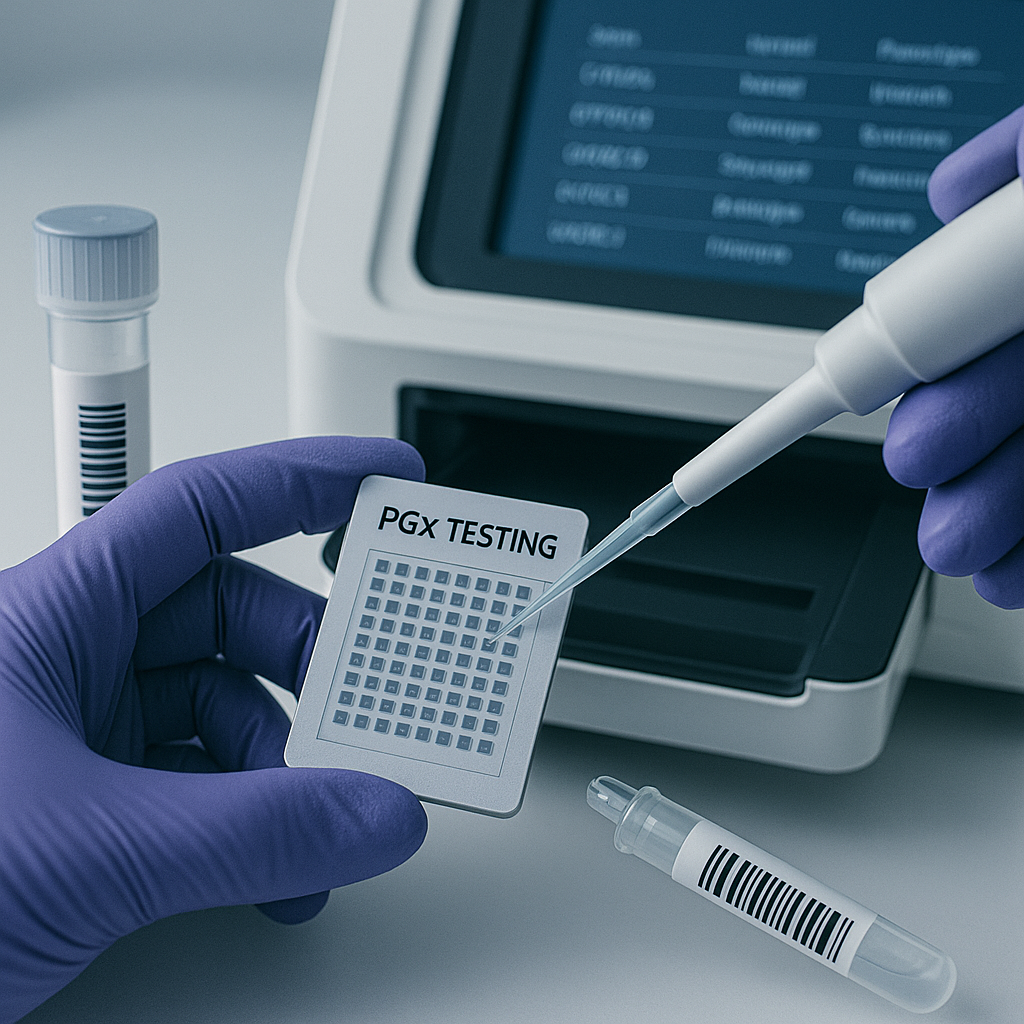Pharmacogenomics (PGx) Testing
Personalized medicine through genetic analysis to optimize drug selection, dosing, and minimize adverse reactions for better patient outcomes.

Personalized Medicine Through Genetics
Pharmacogenomics (PGx) testing analyzes how your genes affect your response to medications. This revolutionary approach to healthcare enables providers to prescribe the right medication at the right dose for each individual patient, reducing trial-and-error prescribing and improving treatment outcomes.
Our comprehensive PGx testing panel examines genetic variants that influence drug metabolism, efficacy, and safety across multiple therapeutic areas including psychiatry, cardiology, pain management, and more.
With over 95% of people having genetic variants that affect their response to medications, PGx testing is becoming an essential tool for precision medicine and improved patient care.
Key Benefits of PGx Testing
Optimize medication therapy through genetic insights
Personalized Dosing
Genetic variants guide optimal medication dosing to maximize efficacy while minimizing side effects.
Reduced Adverse Events
Identify patients at risk for serious adverse drug reactions before they occur.
Faster Treatment Success
Reduce trial-and-error prescribing and achieve therapeutic goals more quickly.
Improved Patient Compliance
Better tolerance and efficacy lead to improved medication adherence and patient satisfaction.
Cost-Effective Care
Reduce healthcare costs by avoiding ineffective treatments and adverse drug reactions.
Lifetime Value
Genetic information doesn't change - one test provides lifelong medication guidance.
Clinical Applications
PGx testing provides valuable insights across multiple therapeutic areas
Psychiatry & Mental Health
- • Antidepressants (SSRIs, SNRIs, TCAs)
- • Antipsychotics
- • Mood stabilizers
- • Anti-anxiety medications
- • ADHD medications
Cardiology
- • Anticoagulants (Warfarin, Clopidogrel)
- • Beta-blockers
- • ACE inhibitors
- • Statins
- • Antiarrhythmics
Pain Management
- • Opioid analgesics
- • NSAIDs
- • Anticonvulsants for neuropathic pain
- • Muscle relaxants
- • Topical analgesics
Primary Care
- • Proton pump inhibitors
- • Diabetes medications
- • Thyroid medications
- • Antibiotics
- • Antihistamines
Oncology
- • Chemotherapy agents
- • Targeted therapies
- • Immunotherapy
- • Supportive care medications
- • Anti-nausea medications
Gastroenterology
- • IBD medications
- • Immunosuppressants
- • Antispasmodics
- • Hepatitis treatments
- • Motility agents
Comprehensive Gene Analysis
Our PGx panel analyzes key pharmacokinetic and pharmacodynamic genes
Pharmacokinetic Genes
These genes affect how medications are absorbed, distributed, metabolized, and eliminated:
- • CYP2D6 - Metabolizes 25% of all medications
- • CYP2C19 - Critical for antidepressants and PPIs
- • CYP2C9 - Important for warfarin and NSAIDs
- • CYP3A4/5 - Metabolizes 50% of all drugs
- • SLCO1B1 - Statin transport and toxicity
- • UGT1A1 - Drug conjugation and elimination
- • DPYD - 5-fluorouracil metabolism
- • TPMT - Thiopurine metabolism
Pharmacodynamic Genes
These genes affect how medications interact with their targets:
- • COMT - Dopamine metabolism and response
- • HTR2A - Serotonin receptor response
- • OPRM1 - Opioid receptor sensitivity
- • ADRB1 - Beta-blocker response
- • VKORC1 - Warfarin sensitivity
- • HLA-B*5701 - Abacavir hypersensitivity
- • HLA-A*3101 - Carbamazepine reactions
- • CACNA1C - Calcium channel blocker response
Simple Testing Process
Easy sample collection with comprehensive results
Sample Collection
Simple buccal swab or saliva collection - no blood draw required
Genetic Analysis
Advanced sequencing and genotyping of key pharmacogenes
Expert Interpretation
Clinical pharmacists and geneticists review and interpret results
Actionable Report
Comprehensive report with specific dosing and drug recommendations
Ready to Personalize Patient Care?
Optimize medication therapy with genetic insights. One test, lifetime of personalized medicine.